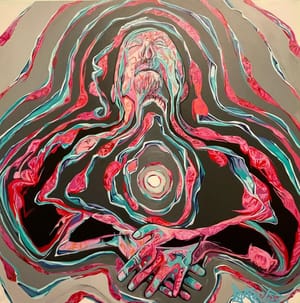
Origin
The second painting in the series is called Wisdom of Tataka. Let me explain tataka for a moment. Tataka is a Japanese word that means fight or battle. Fighting and battle are common ways to motivate a student of martial arts.
However, what motivates us becomes the purpose—and subsequently collapses alternative directions of interest that can lead to great insight. When the physical, familiar theme of fighting and battle eclipses all other routes we could take, the alternative becomes only a competitive approach, used to assemble and reassemble the same features of martial arts we have come to know and recognize. We get stuck there, and so does the art. This force of action is popular, but it does not lead us anywhere other than back to what we already know and recognize. An analogy from the art of music may help illustrate this.
If the motivation to refine the playing of an instrument was created through fighting or battle, the context of not just music but also the instrumentalist would become associated with how best to outdo each other, how best to defeat a fellow instrumentalist, how best to use an instrument as a weapon. Creating music from the collision of air against a reed or a drum being hit by a stick would become an unfortunate concept, ultimately lost to a greater end. In the same way a musician refines their ability to create the melodic themes we call music, so too can a martial artist learn to refine the instrument of themselves through collision and conflict—through what we see as fighting—to uncover the elusive character of something in ourselves that we can't see.
We go beyond the threshold of ourselves, as you may see in this painting, but it takes refinement through something that we do recognize. In the way that a bandage is applied to a wound in order to motivate healing—and yet is not the healing—so too can the application of tataka lead us to inquire into the source of healing. Where might we find it to heal ourselves?
The fighting is not the healing. In the case of martial arts, the fighting is not the art. In this way, tataka may be what motivates interest, but it is a means toward an end that a student of martial arts, just like a musician, is meant to move beyond. We are not meant to assemble our skills there at the recognizable—at things conflicting, things banging and clanging, the battle, the fight. From what we assemble through our training in tataka as martial artists, we begin to understand the way beyond it, to liberate ourselves from that familiar.





